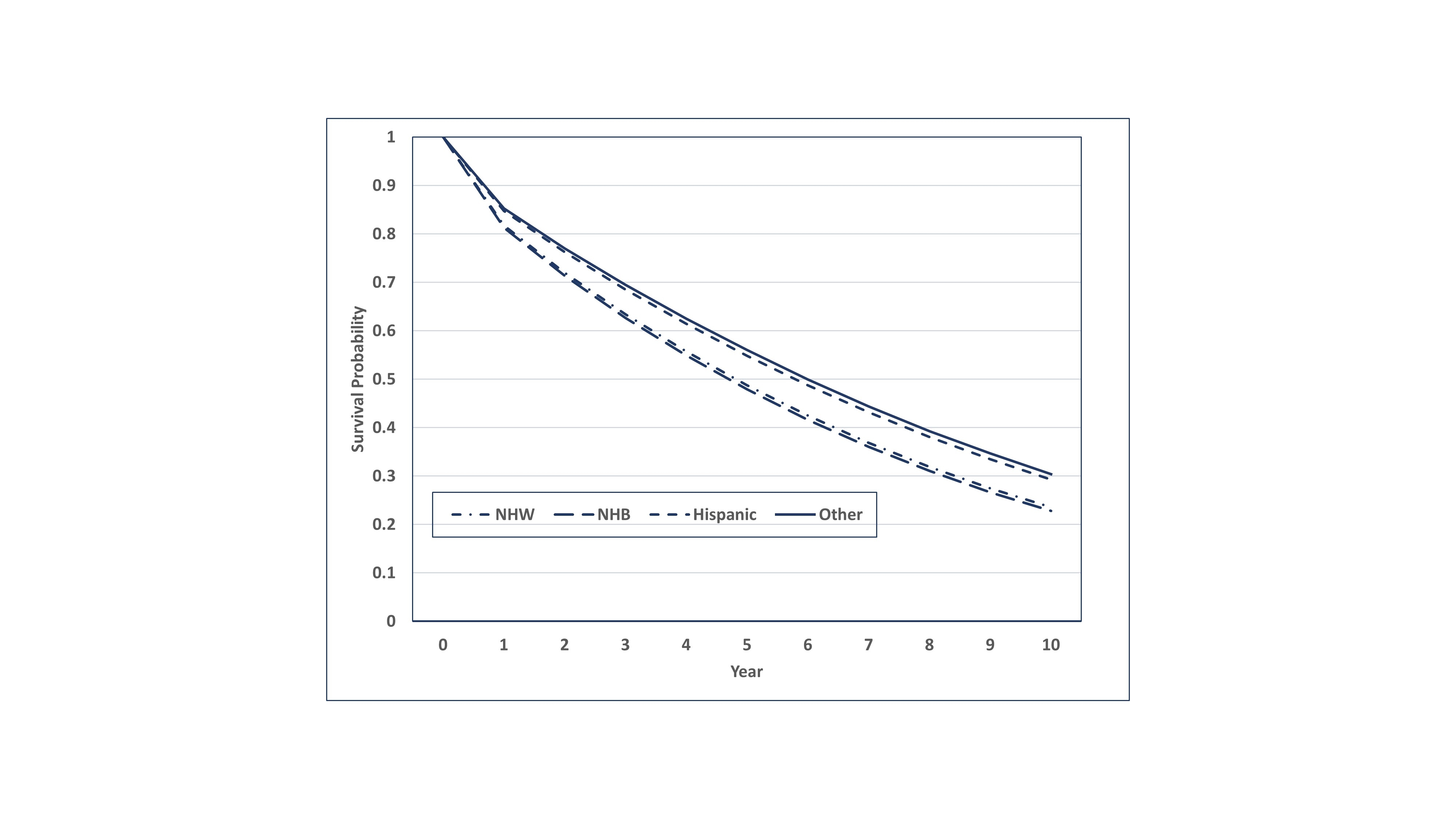Final ID: TMP37
Racial disparities in long-term survival after acute ischemic stroke among Medicare fee-for-service beneficiaries: Medicare cohort 2000-2022
Abstract Body: Introduction: Limited studies have examined racial disparities in long-term survival after acute ischemic stroke (AIS) with inconsistent findings. We examined these disparities among Medicare fee-for-service (FFS) beneficiaries in U.S.
Methods: We analyzed data on 1,997,487 Medicare FFS beneficiaries aged ≥65 years hospitalized with incident AIS (ICD-10 code I63) and survived >30 days from January 1, 2000 to December 31, 2017, and were followed-up until December 31, 2022. Cox proportional hazard models estimated the adjusted hazard ratio (aHR, 95% CI) and adjusted survival curves by race/ethnicity (non-Hispanic White (White), non-Hispanic Black (Black), Hispanic and Other). Models were adjusted for age, sex, and comorbidities.
Results: The median age at AIS hospitalization was 78 years (IQR 72.0-84.0); 57.0% were women; 81.8%, 10.8%, 4.8% and 2.6% were White, Black, Hispanic and Other, respectively. Over a median follow-up of 4.9-years (IQR 1.7-8.8), there were 1,738,452 all-cause deaths. Adjusted 5-year survival after AIS improved from 2000-2004 to 2015-2017 for White (46.5% (95% CI 46.4-46.6) to 50.9% (50.7-51.1)), and Black (46.0% (45.8-46.3) to 48.9% (48.3-49.2)). For Hispanic and Other, survival remained largely unchanged: 54.4% (54.1-54.8) to 54.2% (53.6-54.8)) for Hispanic and 55.9% (55.4-56.4) to 54.7% (54.0-55.5) for Other. A clear pattern of long-term survival after AIS emerged by race/ethnicity showing similar survival between Hispanic and Other and between White and Black people (Figure). Stroke mortality risk was ~25% higher for White and Black compared to Hispanic and Other (aHR 1.25 (1.24-1.26)). This pattern was consistent across age groups and sex.
Conclusions: Long-term survival after AIS has improved for White and Black Medicare FFS beneficiaries over time, while it remained largely unchanged for Hispanic and Other groups. This indicates persistent racial disparities in stroke outcomes.
Methods: We analyzed data on 1,997,487 Medicare FFS beneficiaries aged ≥65 years hospitalized with incident AIS (ICD-10 code I63) and survived >30 days from January 1, 2000 to December 31, 2017, and were followed-up until December 31, 2022. Cox proportional hazard models estimated the adjusted hazard ratio (aHR, 95% CI) and adjusted survival curves by race/ethnicity (non-Hispanic White (White), non-Hispanic Black (Black), Hispanic and Other). Models were adjusted for age, sex, and comorbidities.
Results: The median age at AIS hospitalization was 78 years (IQR 72.0-84.0); 57.0% were women; 81.8%, 10.8%, 4.8% and 2.6% were White, Black, Hispanic and Other, respectively. Over a median follow-up of 4.9-years (IQR 1.7-8.8), there were 1,738,452 all-cause deaths. Adjusted 5-year survival after AIS improved from 2000-2004 to 2015-2017 for White (46.5% (95% CI 46.4-46.6) to 50.9% (50.7-51.1)), and Black (46.0% (45.8-46.3) to 48.9% (48.3-49.2)). For Hispanic and Other, survival remained largely unchanged: 54.4% (54.1-54.8) to 54.2% (53.6-54.8)) for Hispanic and 55.9% (55.4-56.4) to 54.7% (54.0-55.5) for Other. A clear pattern of long-term survival after AIS emerged by race/ethnicity showing similar survival between Hispanic and Other and between White and Black people (Figure). Stroke mortality risk was ~25% higher for White and Black compared to Hispanic and Other (aHR 1.25 (1.24-1.26)). This pattern was consistent across age groups and sex.
Conclusions: Long-term survival after AIS has improved for White and Black Medicare FFS beneficiaries over time, while it remained largely unchanged for Hispanic and Other groups. This indicates persistent racial disparities in stroke outcomes.
More abstracts on this topic:
Association Between Perceived Discrimination and Depression/Anxiety Symptoms
Tang Zhengxin, Lv Nan, Ma Jun
A Measurement Model of Socioeconomic Status and its Association with Cardiovascular Disease in the Hispanic Community Health Study/Study of LatinosCordero Christina, Llabre Maria, Romaker Emma, Kobayashi Marissa, Gianola Morgan, Gallo Linda, Isasi Carmen, Perreira Krista, Corsino Leonor, Zhou Laura
Readers' Comments
We encourage you to enter the discussion by posting your comments and questions below.
Presenters will be notified of your post so that they can respond as appropriate.
This discussion platform is provided to foster engagement, and simulate conversation and knowledge sharing.
You have to be authorized to post a comment. Please, Login or Signup.
Rate this abstract
(Maximum characters: 500)

